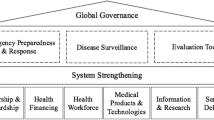Abstract
The extraordinary complexity of emerging infectious diseases calls for new paradigms and approaches to understand the casual mechanisms underlying pathogen emergence and to improve disease prevention. An attempt was made to foster interdisciplinary collaboration and stimulate transdisciplinary approaches to improve emerging infectious disease research during and subsequent to a meeting held in March 2005 as part of the US NIH Roadmap initiative “Research Teams of the Future.” The meeting drew on models and theories associated with the idea of humans and nature as interactive, complex systems. Of the three diseases chosen as case studies to represent the wide range of social and ecological emergence factors involved (dengue, leptospirosis, and HIV/AIDS), HIV/AIDS proved especially difficult. This Profile examines the meeting themes with a particular focus on the deliberations of a working group focused on HIV/AIDS. Attention is given to the challenges of bridging different disciplines and perspectives in applying a social-ecological framework to analyze HIV/AIDS and the benefits of reductionistic vs. holistic strategies in responding to the global HIV/AIDS pandemic. The issues raised point to opportunities to significantly deepen understanding of HIV/AIDS as a transdisciplinary problem.
Similar content being viewed by others
References
Brown T, Peerapatanapokin W (2004) The Asian epidemic model: a process model for exploring HIV policy and program alternatives in Asia. Sexually Transmitted Infection 80(Suppl 1):119–124
Cambodian farmers, Chaya O, du Guerny J, Geeves R, Kato M, Hsu L-N (2004) Farmer’s Life School Manual, a joint publica- tion of UNDP, FAO, and World Education, ISBN: 974-91708-1-4. Available: http://www.hiv-development.org/publications/FLS. htm
Campbell C (2003) Letting Them Die: Why HIV/AIDS Prevention Programmes Fail, London, UK: International African Institute
du Guerny J, Hsu L-N (2004) Environment and Development Interactions: Implications for HIV and Other Infectious Diseases. A Development Strategy to Empower Rural Farmers and Prevent HIV. UNDP Southeast Asia HIV and Development Project, Bangkok. Available: http://www.hiv-development.org/publications/HESA.asp [accessed August 10, 2005]
du Guerny J, Hsu L-N, Chitna S (2002) A Development Strategy to Empower Rural Farmers and Prevent HIV. UNDP South East Asia HIV and Development Project, Bangkok. Available: http://www.hiv-development.org/publications/env_agrri.htm [accessed August 10, 2005]
Farmer P (2003) Pathologies of Power: Health, Human Rights and the New War on the Poor, Berkeley, CA: University of California Press
Foller M-L, Thorn H (editors) (2004) No Name Fever: AIDS in the Age of Globalization, Lund, Sweden: Studentlitteratur
Hsu L-N (2004) Building Dynamic Democratic Governance and HIV-Resilient Societies, Bangkok: UNDP and UNAIDS
Kimball AM, Arima Y, Hodbes J (2005) Trade related infections: farther, faster, quieter. Globalization and Health 1:3. Available: http://www.globalizationandhealth.com/contnet/1/1/3
Mayer JD (1996) Political ecology as one new focus for medical geography. Progress in Human Geography 20:441–456
Mayer JD (2000) Geography, ecology, and emerging infectious diseases. Social Science and Medicine 50:937–952
Millennium Project Task Force on HIV/AIDS, TB, and Access to Essential Medicines Working Group on HIV/AIDS (2005) Combating AIDS in the Developing World, Paul A. Wilson, lead author, U.N. Millennium Project, London and Sterling, VA: Earthscan
Osterholm M (2005) Preparing for the next pandemic. Foreign Affair 84:25–37
Parkes MW, Bienen L, Breilh J, Hsu L-N, McDonald M, Patz JA, et al. (2005) All hands on deck: transdisciplinary approaches to emerging infectious disease. EcoHealth 2 (DOI: 10.1007/s10393-005-8387-y, this issue)
Ruxrungtham K, Brown T, Phanuphak P (2004) AIDS in Asia. Lancet 364:69–82
Sauve N, Dzokoto A, Opare B, Kaitoo EE, Khonde N, Mondor M, et al. (2002) The price of development: HIV infection in a semiurban community of Ghana. JAIDS 20:402–408
Scalway T (2003) Missing the Message? 20 Years of Learning from HIV/AIDS, London: Panos Institute
Spiegel J, Bennett S, Hattersley L, Hayden MH, Kittayapong P, Nalim S, et al. (2005) Barriers and bridges to prevention and control of dengue: the need for a social-ecological approach. EcoHealth 2 (DOI: 10.1007/s10393-005-8388-x, this issue)
Vinetz JM, Wilcox BA, Aguirre A, Gollin LX, Katz AR, Fujioka RS, et al. (2005) Beyond disciplinary boundaries: leptospirosis as a model of incorporating transdisciplinary approaches to understand infectious disease emergence. EcoHealth 2 (DOI: 10.1007/s10393-005-8638-y, this issue)
Wilcox BA, Colwell RR (2005) Emerging and reemerging infectious diseases: biocomplexity as an interdisciplinary paradigm. EcoHealth 2 (DOI: 10.1007/s10393-005-8961-3, this issue)
Author information
Authors and Affiliations
Corresponding author
Additional information
Disclaimer: The author is Director of the Research Program at the East–West Center and was chair of the HIV/AIDS mini-symposium. This Profile is based on the important contributions and efforts of all the members of the HIV/AIDS working group. All omissions or misrepresentations are the author’s.
Rights and permissions
About this article
Cite this article
Lewis, N.D. Is the Social–Ecological Framework Useful in Understanding Infectious Diseases? The Case of HIV/AIDS. EcoHealth 2, 343–348 (2005). https://doi.org/10.1007/s10393-005-8477-x
Published:
Issue Date:
DOI: https://doi.org/10.1007/s10393-005-8477-x




